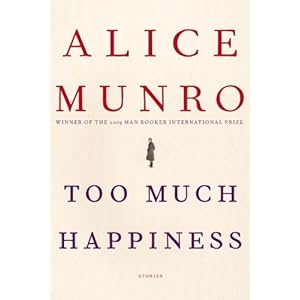 I find it really odd that Alice Munro's latest collection of short stories (and 2009 Booker Prize winner), Too Much Happiness is pretty darn depressing.
I find it really odd that Alice Munro's latest collection of short stories (and 2009 Booker Prize winner), Too Much Happiness is pretty darn depressing. Some of the 10 stories are unbelievably tragic. But two in particular moved me.
"Face" is told as a man recounting his childhood--the man was born with a port wine birthmark. His father is horrified and wants his wife to put the baby in an institution, as they probably did when the story takes place. But the mom doesn't and the son turns out to have a successful life, even though the father would not even look at him. In one scene, the boy is playing with a childhood friend, when his friend paints half of her face purple. Not being mean, but because she wanted to be like him. But the boy's mom completely freaked out. However, at that point she realized that she could no longer shelter him from the world and enrolled him in boarding school.
Another story "Child's Play" is also told as a character (Marlene) recounting her childhood. The story centers around a secret she's carried all her life about a time in camp with her best friend Charlene. And the family who shared their duplex and the girl Verna who lived there. And Verna is a "Special."
This part of the story takes place right after the Depression, right before WWII. But I wonder if the sentiments that are relayed here are still true among kids today. "From the very beginning I had an aversion to her unlike anything I had felt up to that time for any other person. I said that I hated her, and my mother said, How can you, what has she ever done to you?" "Children of course are monstrously conventional, repelled at once by whatever is off-center, out of whack, unmangeable."
Verna shows up at summer camp (along with other "Specials", I was actually sort of impressed that they were trying to include them with the other kids back in the 1930s) and what happens between Verna and Marlene & Charlene ends up being tragic.
But it is something that haunts them until adulthood. Marlene even writes a book that explores "the attitude towards people who are mentally or physically unique."
And the story haunted me also. A child's view of the intellectually disabled. I couldn't read anything else for weeks and I still cry when I think about it.
This hardcover book is up for grabs. I'm wondering if anyone else feels the same way about that story (the other eight stories are also very good and insightful, although a couple of them had me scratching my head).

Huh. I actually have this book. My husband, being a nice guy, bought it for me because he knows I like books, but apparently doesn't really know what kind of books I like ;) It's been sitting on my shelf untouched for quite a while, as I'm just not really one for a collection of short stories. Great review, Ecki, but I seriously doubt I'll ever read it now!
ReplyDeleteIt's funny, a couple ladies at my book club also said that they don't read short stories. I suppose it's a completely different art form. But you should read that one story, since I'm wondering if my reaction to it was overboard!
ReplyDelete